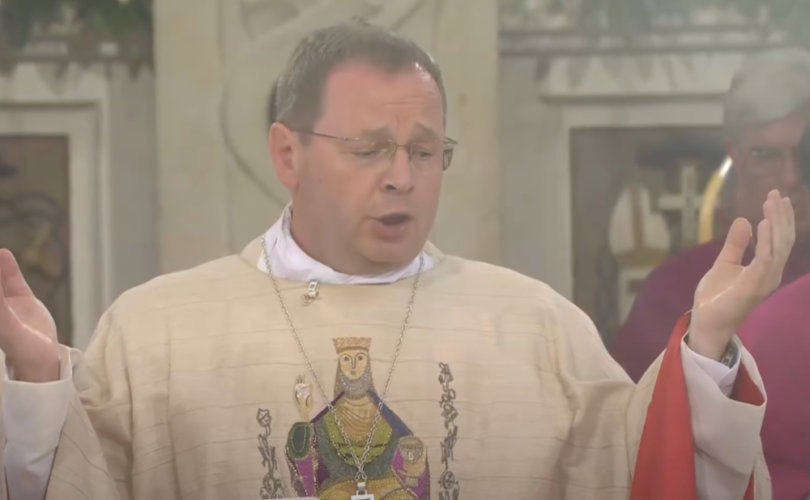FULDA, Germany (LifeSiteNews) — In a recent press conference the head of the German Bishops Conference, Bishop Georg Bätzing, said that “reforms must not stop at Church teaching” when asked about the “reform process” of his country’s heterodox Synodal Way.
Monday’s press conference marked the beginning of the “Autumn General Assembly” of the German bishops in Fulda, Germany.
In fielding questions from the press prior to the assembly, Bätzing was asked how he sees the differences in opinion among the German bishops, and how he plans to present the results of the recent Fourth Synodal Way Assembly to Rome during the German bishops’ ad limina visit in November.
In response he stated:
We carry the situation as it is, among us 69 bishops, to Rome. We feel that there is also an attempt to make politics with the different positions and possibly also partisanship. But I think we have to get rid of that.
Bätzing also said that “there is a very clear two-thirds to three-quarter majority of the German Bishops’ Conference who explicitly says that we have to move forward, that reforms are needed.”
And these reforms must not stop at Church teaching, otherwise, there will always be a certain discomfort, especially for pastors, who always have to personally endure the dichotomy between doctrine and practice, and not least the faithful who do so. We really want to try new approaches here.
When talking about “reforms” Bätzing was referring to the documents that were voted on during the Fourth Synodal Assembly from 8-10 September 2022, including changing Church teaching on homosexuality, calling homosexual acts “not a sin,” and calling for female ordinations.
Addressing the criticism of some of the Synodal Way’s documents, as made by Bishop Stefan Oster, Bätzing said: “Everyone has to look at himself and ask how he can approach others, and always voting ‘No’ is certainly not the right way.”
When asked by a reporter if the German “reforms” would just follow the Zeitgeist, Bätzing gave a lengthy and convoluted answer, appearing to downplay concerns over the widespread sexual immorality found in society:
Is the Zeitgeist still: liberality, diversity, plurality, which we as a Church must approach, or are there not other signs that stand today for a spirit of the times, which we have to resist tremendously, like authoritarian behavior, autocratic government, criticism of democracy up to hostility to democracy, that is the spirit of the times that arises today?
And when I hear so many voices from Rome, then I believe they should take care of this zeitgeist and with the decisions we make, we want to carry the currents of this time, which have their foundation in faith, to the people. This really has nothing to do with the simplistic zeitgeist. The currents of the times we are afraid of and have to beware of are completely different and we have to fight against them.
During the press conference, Bätzing also weighed in on the election result in Italy, calling it a “real threat to cohesion in Europe.” Giorgia Meloni, who will likely become Italy’s new Prime Minister, is a self-professed Catholic who holds certain pro-family and pro-life values.
This election result he described as “the zeitgeist that you have to fight.”
Moreover, when Bätzing was asked about the handling of sexual abuse inside the Church, he said: “We have created criteria and structures on how to deal with abuse, through affected advisory boards and independent commissions,” adding that “we want to put the responsibility on a broader footing.”
The German prelate did not mention the recent serious allegations against the vice president of the German Bishops’ Conference, Bishop Franz-Josef Bode, who – in a 600-page report conducted by a group of lawyers and historians – was accused of having knowingly appointed abusive priests.
Bode did not dispute the allegations and acknowledged that he was “blind to the suffering and perspectives of those affected,” but refused to resign after the report was made public.

